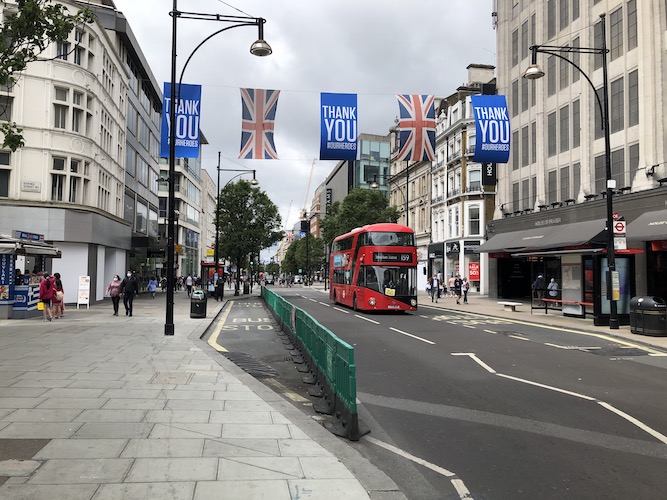Earlier this month, the government published its “summary of responses” to a consultation relating to a new approach to duty-free and VAT regulations. This will affect international visitors entering and leaving the UK under what it calls the country’s “new relationship with the EU”. The Treasury document addresses a rather dry subject. Yet it contains a policy bombshell.
Many companies in London’s retail and aviation sectors had been hoping the government would extend to EU nationals the tax-free shopping perks currently enjoyed by visitors to the UK from the rest of the world. This would be a way of helping businesses and the economy to ultimately recover from the devastating effects of Covid-19.
Instead, the exact opposite has been announced. Rather than widening the VAT refund regime, the government intends to take in away from everyone. This means that tourists from say China, the US or India who come to the West End will no longer be able to reclaim sales taxes paid on goods they choose to take home with them, effectively adding 20% to the price.
This will provide potential international travellers with one more reason to by-pass London – and indeed the UK as a whole. Instead, they may well be heading to Paris, Amsterdam or Milan. That would put UK retailers – and airports at a competitive disadvantage.
Why make these changes? The government says it is concerned about the extent to which discounts are passed on to consumers. Their report frets about the complexity of the bureaucracy associated with the existing system. But the Treasury’s (widely supported) “eat out to help out” campaign and reduction of VAT to 5% for the hospitality sector did not fall at these fences. Any comparison with the red tape regime for exporting to the EU post-Brexit, makes the VAT refund system look highly efficient and well run.
With the Covid-19 pandemic battering high streets and air travel in equal measure, the new policy shift could not come at a worse time. Research suggests that the move turns a potential £2 billion-plus shopping bonus (associated with the extension of tax-free shopping to the EU) into a £3.5 billion loss of sales. It could put as many as 70,000 jobs across the country in jeopardy as the retail, hotel and transport sectors see overseas tourists and their spending divert to mainland Europe.
The government states in its report that the discount “is a costly relief which does not benefit the whole of GB equally, with the current use of the scheme largely centred on London.” But no economic impact analysis of the costs or benefits of abolishing the regime is provided. Evidence from elsewhere suggests that in overall terms it will be damaging to the British economy – and ironically to government revenues that are generated by tourists spending on for example, hotels, restaurants and air transport.
It is hard not to conclude that the change in policy is driven at least in part by the government’s quest to “level up” the British economy. But the reality is that it may well lead to levelling down. This would be the latest in a series of policies that risk damaging London. Most glaring is the harm already underway to the financial services sector. Ever since the referendum, the City has been left facing huge uncertainty over post-Brexit trading arrangements with its largest market. Then there is the lukewarm Covid-19 support to make air travel easier – another sector predominantly based in London and the south east.
And any analysis of how Transport for London’s financial crisis has been dealt with compared with private operators suggests that it has come in for special treatment, as a political battle rages between Number 10 and London’s Labour Mayor.
Many of those who care about the future of London should be concerned. Misleading analysis of UK regional inequalities has given cover to many of these initiatives. Little has been done to confront an often distorted narrative surrounding the nature of British inequality and deprivation. London’s leadership appears at times wary of taking the fight to government.
But should it be? Despite its long-standing reluctance to give London more control over its own finances, the Treasury deep down knows that the capital has been a cash cow for public service provision in other parts of the country. In 2018/19, London’s fiscal surplus reached a staggering £39 billion, equivalent to three-quarters of the UK’s entire defence budget.
The axing of tax-free shopping has the hallmark of being driven by spin doctors and special advisors in government. It risks being the latest in a series of anti-London policies lined up for departure. Whatever their disagreements, London and the Treasury should do their best to prevent it from taking off.
Alexander Jan is chair of the Midtown business improvement district and former chief economist at Arup. Follow Alex on Twitter.
OnLondon.co.uk exists to provide fair and thorough coverage of the UK capital’s politics, development and culture. It depends greatly on donations from readers. Give £5 a month or £50 a year and you will receive the On London Extra Thursday email, which rounds up London news, views and information from a wide range of sources. Click here to donate directly or contact davehillonlondon@gmail.com for bank account details. Thanks.
